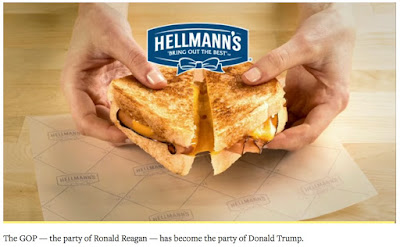Ever notice how cries of "fake news!" slip out of the news when the news outlets have some fake news to slip over? Oh, first let me show you Trump's new tweet:
Can you imagine if the election results were the opposite and WE tried to play the Russia/CIA card. It would be called conspiracy theory!— Donald J. Trump (@realDonaldTrump) December 12, 2016
Now, let's get down to the work of checking to see whether the NYT really presents evidence to justify that headline. I'm reading every word of the rather long article but will only give you the actual evidence offered for the proposition that the Russian government intervened in the U.S. election for the purpose of helping Donald Trump win. There's a lot of material in the article that is not about that at all. I'm excluding that, which is padding if the headline is the correct headline. Go to the link if you want to see what it is.
The first relevant material comes in the 16th paragraph: The DNC's servers and John Podesta's email account were hacked and a lot of damaging and embarrassing material was released onto the internet.
Next:
American intelligence officials believe that Russia also penetrated databases housing Republican National Committee data, but chose to release documents only on the Democrats. The committee has denied that it was hacked.So here's the crucial disputed question of fact: Were the GOP servers also hacked? We're not told what evidence supports the belief that the GOP servers were also hacked, but the GOP says they were not. Yet some "intelligence officials believe" it was. Why? Where's the "swell of evidence" you were going to tell me about?
Even if that fact were nailed down, there would still be more leaps needed to get to the conclusion. First: Was there any embarrassing material? What? If I knew what, I could begin to think about the next question: Why would embarrassing material be withheld? All I can see from the supposed "swell of evidence" here is an assumption that if the DNC was hacked, the GOP committee was also hacked, and that if bad material was found in the DNC server, bad material would also be found in the GOP server, and since we only saw the DNC material, there must have been a conscious decision — by whom?! — to leak only the DNC things and that decision must have been made to help Trump win. That's not evidence itself, only inference based on evidence.
Finally, there are a few paragraphs about why "Putin and the Russian government" might be thought to prefer a Trump presidency to a Clinton presidency. Trump and Putin have given each other some compliments.
That's no swell of evidence! That's a lot of leaping guesswork. And this is nothing more than I already read in the article the NYT put out on December 9th, which I put effort into combing through and rejected for the same reasons I'm putting in this new post.
This might be the biggest fake news story I've ever seen!
Squirreled away at the end of the article is the admission that people at the FBI are skeptical about the conclusion. An unnamed "senior American law enforcement official" told the NYT that "the Russians probably had a combination of goals, including damaging Mrs. Clinton and undermining American democratic institutions" and that "any disagreement between the F.B.I. and the C.I.A., and suggested that the C.I.A.’s conclusions were probably more nuanced than they were being framed in the news media." The NYT observes that the FBI holds itself to "higher standards of proof," since its work is geared toward prosecuting criminal cases in court, but: "The C.I.A. has a broader mandate to develop intelligence assessments."
I'm staring at that headline again. You said there was a "swell of evidence." Shouldn't that satisfy the FBI's higher standard rather than the good-enough-for-the-CIA standard? I think I see the reason for the different standards. The CIA is concerned about what might happen in the future. But why are we trusting them in an FBI/CIA disagreement about what happened in the past?
The very end of the NYT article is about the FBI investigating "numerous possible connections between Russians and members of Mr. Trump’s inner circle, including former Trump aides like Paul Manafort and Carter Page, as well as a mysterious and unexplained trail of computer activity between the Trump Organization and an email account at a large Russian bank, Alfa Bank." This investigation began in the summer and seems to have played out by September and October — for reasons that are "are not entirely clear" and that the FBI won't talk about.
Speaking of embarrassing material... that headline, with that content... in the NYT. So awful.
I'm distracted into reading about the word "swell" in my dictionary (the OED). One usually reads of a swell of the sea or of music or emotion. "Fenc'd no where from the least Surge or Swell of the Water," wrote Daniel Dafoe. "And up the valley came a swell of music on the wind," wrote Tennyson. "Of all the actors who flourished in my time... Bensley had most of the swell of soul, was greatest in the delivery of heroic conceptions, the emotions consequent upon the presentment of a great idea to the fancy," wrote Charles Lamb.
But swell of evidence...
Swell is the talk of upwelling emotion and romanticism.
Swell is a tell.





